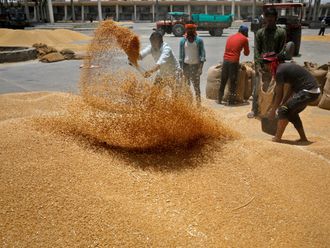New Delhi: Before Wednesday’s Supreme Court (SC) ruling — that a man is committing rape if he engages in sexual intercourse with his wife who is aged between 15 and 18 — there was an exception in rape law provisions in India that protected a man who had sexual relations with his wife even if she was under 18. Last month, SC asked the central government how Parliament could create an exception in a law when the age of consent was 18.
In reaction to the verdict on Wednesday, many hailed it and asked for its proper implementation.
“The Supreme Court verdict upholds the rights of 23 million child brides in the country. It indeed is a good decision. Child marriage is a curse for young people. Supreme Court’s intervention is timely and welcome,” Delhi-based civil engineer Ravish Chandra, 29, told Gulf News.
In India, economic and educational development is still uneven and child marriages are still rampant.
“Prohibition of Child Marriage Act states that a girl in India cannot marry before the age of 18, and a boy before 21. So, the marriage is illegal and not valid in India. We cannot consider them as couples. We should stop pronouncing them as husband and wife in the first place. So what is the question of allowing someone to marry off his or her daughter at 15,” asked Mumbai-based civil rights activist Manjari Mishra, 34.
Delhi-based software engineer Ramneek Malik, 38, feels that “marriage is society’s way of allowing for the purpose of having children, since the married couple will then have to make the necessary sacrifices to bring up the children. If under 18 is statutory rape, then why allow the marriage in the first place?”
A cross section of society feels all state governments should ensure speedy implementation of the SC decision in order to check child marriages in India.
“Since the legal age for marriage is 18 years in India, the ruling makes good sense. It will, in fact, discourage child and under-age marriages in India and also reduce the overall birth rate,” says Mumbai-based lawyer Amit Goradia, 43.
But there are practical issues that need to be addressed before the implementation of the SC decision.
“I believe 60 per cent of girls in villages are below 18 when they get married. So half of the boys from rural areas should be behind bars for rape. This is not a practical verdict,” says 40-year-old Delhi-based architect Jeevan Jyot Sharma.
Some feel criminalising the consummation of a marriage with such a serious offence such as rape would not be appropriate and practical.
“It is prayed that the Supreme Court suo motu reviews its judgement in view of Muslim Personal Law sanctions. The judgement deprives the Muslims of the fundamental right guaranteed under Article 25 of the Constitution of India,” says Kolkata-based software engineer Naved Khan, 44.











